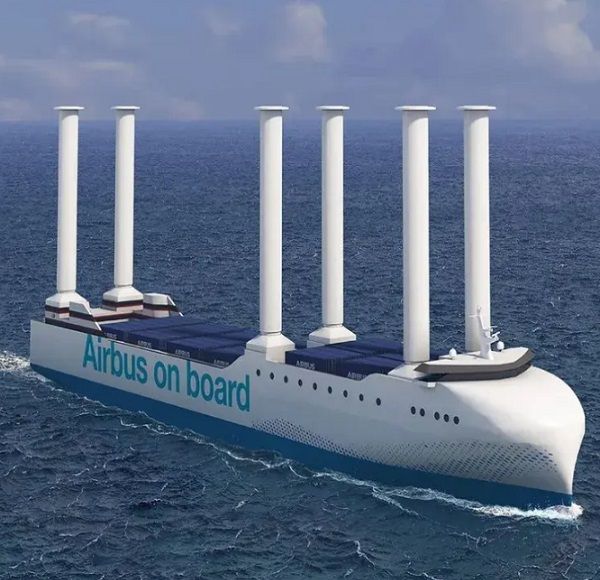Airbus unveils a hydrogen-powered engine, marking a significant step toward zero-emission aviation and a greener future for the industry.
European aviation giant Airbus sets its sights on reducing carbon emissions throughout its production process, starting with overhauling its maritime fleet, the company announced in a press release.
In a move to align with its commitment to sustainable aerospace and reduce the carbon footprint of its industrial operations, Airbus is set to upgrade its maritime transport fleet for transatlantic assembly transport. The plan, unveiled in an official release, outlines a comprehensive strategy to reduce CO2 emissions and enhance environmental sustainability in the aerospace sector.
Low-emission ships with wind propulsion
From 2026, Airbus will introduce three new roll-on/roll-off vessels specifically designed to efficiently transport aircraft components between its European production facilities and the United States. Their low-emission propulsion system sets these ships apart, which combines maritime diesel oil, e-methanol, and wind-assisted technology. The deployment of wind-propulsion, including six Flettner rotors, is a groundbreaking move that demonstrates Airbus’ commitment to decarbonizing its sector.
The new fleet is expected to reduce annual transatlantic CO2 emissions from 68,000 to 33,000 tonnes by 2030. This will contribute to Airbus’ commitment to reduce its overall industrial emissions by up to 63 percent by the end of the decade – compared to 2015 as the baseline year – in line with the 34.7° Fahrenheit (1.5°C) pathway of the Paris Agreement.
Nicolas Chrétien, Head of Sustainability and Environment at Airbus, shared Airbus’ vision for the project, emphasizing the innovative approach: “This demonstrates our determination to lead the way in decarbonizing our sector by innovating not just in aviation, but across all our industrial operations.”
Optimized routing and enhanced efficiency
Using Flettner rotors, tall rotating cylinders that generate lift from the wind, will optimize the ships’ journey across the Atlantic. This innovative technology aims to maximize wind propulsion while avoiding the drag caused by adverse ocean conditions.
This significant upgrade to Airbus’ maritime fleet will enable the company to halve its Atlantic fleet fuel burn and CO2 emissions by 2030 compared to a 2023 baseline. By 2040, Airbus envisions the three new ships emitting as little as 5,000 tonnes of CO2 each, significantly reducing their carbon footprint.
Transitioning towards green energy sources
In addition to wind-assisted propulsion, Airbus invests in sustainable aviation fuels (SAFs) and carbon removal systems to further enhance its environmental sustainability efforts. Through a partnership with easyJet, Airbus is exploring using Direct Air Carbon Capture and Storage (DACCS) technology to remove CO2 from the air. While it may not directly eliminate greenhouse gas emissions from air travel, this system offers an alternative approach to support airlines in achieving their net-zero emissions goals.
Expanding capacity and future potential
Each new transatlantic vessel will be able to transport approximately seventy 40-foot containers and six single-aisle aircraft subassembly sets, substantially increasing the efficiency of Airbus’ assembly process. This extra capacity supports Airbus’ ambitious production ramp-up. It opens possibilities for servicing the transport needs of other Airbus divisions and partners, including humanitarian aid initiatives conducted by the Airbus Foundation.
The overhaul of Airbus’ maritime fleet is set to revolutionize the aviation industry’s approach to emissions reduction, showcasing a holistic commitment to sustainability from production to transport. As Airbus embarks on this journey, it seeks to set new standards for environmental responsibility in the aerospace sector.
Airbus continues its journey towards zero-emission aviation
A year ago, Airbus embarked on a mission to transform aviation with its hydrogen-powered fuel cell engine, marking a pivotal step in its commitment to a greener future.
A year ago, Airbus set a bold course toward pioneering zero-emission aviation by introducing a revolutionary hydrogen-powered fuel cell engine. This innovation reaffirms Airbus’ dedication to sustainable aerospace and positions them at the forefront of the industry’s sustainability efforts. By harnessing the potential of hydrogen as a clean and renewable power source, Airbus aims to pave the way for a new era in aviation where carbon emissions become a thing of the past. As the aerospace giant enters the ground and flight testing phase for this innovative technology, the industry eagerly anticipates the realization of Airbus’ vision for greener skies.
Source: IE










